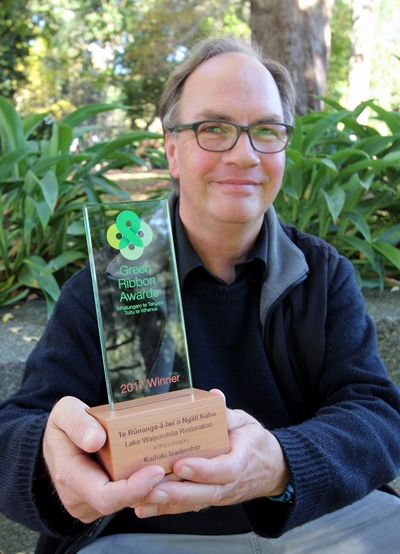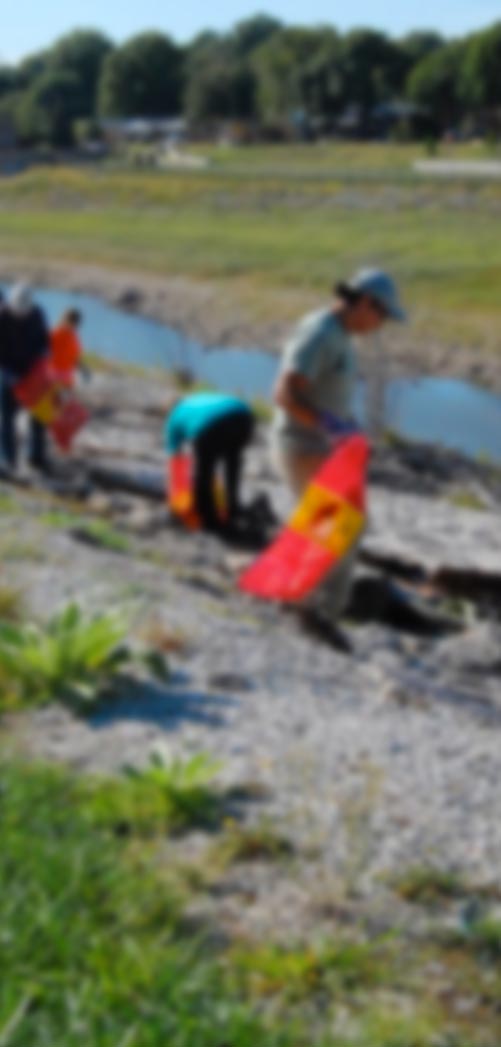The partners attempting to restore Lake Waiporohita on the Karikari Peninsula are thrilled their work has just been recognised with a national Ministry for the Environment Green Ribbon Award.
Local runanga Ngāti Kahu, the Northland Regional Council, the Department of Conservation (as current manager of the lake-bed and marginal strip) and Landcorp (which farms the Rangiputa Station surrounding it) have all been working to protect the 6.9ha dune lake, off Inland Road.
The project includes fencing, exotic tree removal and riparian replanting which will allow the lake to recover the ability to filter land-based nutrients and a management plan is also being written to protect and restore it.
In Wellington on Thursday, 8 June the project was acknowledged with a 2017 Green Ribbon Award, recognising exceptional environmental and conservation initiatives throughout New Zealand.
Ironically, such is their dedication to the lake’s restoration, Ngāti Kahu did not attend the Wellington awards ceremony as it clashed with riparian planting days that saw volunteers plant an estimated 3000-plus natives at the lake over the past two days.
Anahera Herbert-Graves, Chief Executive for Te Rūnanga-ā-Iwi o Ngāti Kahu, says Ngāti Kahu is pleased and humbled by its award in the ‘Kaitiaki Leadership’ section, one of 10 categories in this year’s awards. Collectively, the awards judges considered almost 150 nominations from across New Zealand.
The runanga and its partners were one of two finalists in its category; the other being Para Kore Marae Incorporated’s ‘Zero waste in Māori communities’. (Para Kore is a community Maori organisation which educates and trains marae how to minimise waste.)
Anahera Herbert-Graves says Lake Waiporohita is a taonga, not just to local tangata whenua, but to all Northlanders and the Green Ribbon Award nomination recognises this.
Currently one of just 12 dune lakes in Northland officially classed as being in an outstanding ecological state, Waiporohita has nonetheless been at increasing risk from people unaware of its special status, including those driving in to it to use it as an unofficial car wash.
“Our dune lakes are under already multiple stresses, including nutrient runoff, invasive pest fish and water weeds, and cumulative effects from use by the wider public,” she says.
“But Waiporohita has an added threat in that it is one of only several dune lakes in Northland that are easily accessible to the public, putting it at even greater risk of transfer of water weeds and pest fish.”
The manager of the Northland Regional Council’s Kaitaia office, Peter Wiessing, says the lake area is being landscaped using locally sourced materials, native plantings and signage to let the public know that vehicle and boat access will no longer be tolerated in the lake.
Similarly, the partners are also keen to work with officials to try to better manage large numbers of Canada geese which gather at the lake and foul it with their waste.
Mr Wiessing says the council is pleased to see the hard work of so many parties recognised by the organisers of the Green Ribbon Awards and is happy that it is able to play a part in its success.

Regional council Lakes Catchment Advisor Will Trusewich back in Northland today with the freshly-collected Green Ribbon Award recognising Ngāti Kahu and its partners working to restore Lake Waiporohita. Ngāti Kahu did not attend the Wellington awards as they coincided with extensive riparian planting days they were holding at the lake this week.
